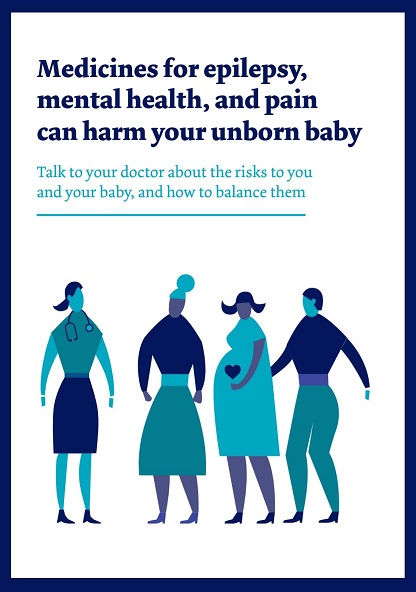Antidepressants in pregnancy
Key points about antidepressants in pregnancy
- Every woman's experience of depression before or during pregnancy is unique and will affect whether you continue to take antidepressants during pregnancy.
- All antidepressants carry some risks. Some antidepressants are much less likely to affect your baby than others.
- However, if depression isn't treated during pregnancy, and you have a relapse, it can affect not just your health, but also your baby's wellbeing and your bonding with your baby.
- Together with your healthcare provider you can work out the best plan for your situation.

If you become pregnant while you're taking antidepressants, you need to talk to your healthcare provider as soon as you think you might be pregnant. Never stop taking your medicine without talking to your healthcare provider first.
The decision about whether to take antidepressants while you're pregnant depends on:
- how severe your symptoms are
- your history of depression
- which antidepressant you’re taking, how well it works for you and how long you’ve been taking it
- whether other ways of coping (eg, lifestyle changes, therapy and more support) will be enough to manage your depression without medication.
Together with your healthcare provider, you’ll discuss the pros and cons of staying on or coming off your antidepressant medicine.
You can make an informed decision once you’ve compared the risks of taking the medicine with the risks of living with and managing your symptoms.
Read more about your health and wellbeing during pregnancy, supporting your pregnant partner, pregnancy support and apps during pregnancy.
If you wish to start a family, it’s important to plan your pregnancy ahead of time. It’s important not to stop taking your antidepressant medicine without the guidance of your healthcare provider.
Talk to your healthcare provider about the medicines you’re taking. It’s best to understand the risks and benefits and review your medicines before you get pregnant.
Some antidepressant medicines are safer to use during pregnancy.
If you’re taking antidepressants and are planning to become pregnant, some options are to:
- continue with your antidepressant if the benefit of taking the medicine is greater than the risk during pregnancy
- switch to an antidepressant that is safer in pregnancy
- try a slow, gradual withdrawal of the antidepressant with the help of your healthcare provider.
If coming off antidepressants isn’t possible at the moment, you may want to think about delaying the pregnancy until you no longer need treatment.
Also, all women who are planning a pregnancy are advised to take folic acid before conception (before they get pregnant), to reduce the chance of neural tube defects, such as spina bifida.
All medicines, including antidepressants carry some risks if taken during pregnancy. Some antidepressants such as selective serotonin reuptake inhibitors (SSRIs) and tricyclic antidepressants (TCAs) are much less likely to harm your baby than others.
The long-term impact of taking antidepressants in pregnancy isn't clear. There's limited information about many medicines in pregnancy because it’s not ethical to conduct clinical trials involving pregnant people. Research that has been done is often mixed and conflicting; one study may find that a particular antidepressant causes one type of risk. Another study may find that it doesn’t.
Risks to the baby can also be different depending on when in the pregnancy it’s taken.
Some antidepressants may increase the risk of:
- mild effects in a newborn, such as a slightly lower weight at birth, mild breathing problems, irritability and feeding problems
- certain birth defects, such as problems with the brain, spine or organs
- your baby being born before its expected date.
| If you’re taking carbamazepine, lithium, paroxetine, venlafaxine, lamotrigine or sodium valproate (or your partner is taking sodium valproate), you should contact your healthcare provider to be managed by a maternity mental health team during your pregnancy. |
If you're taking antidepressants during your pregnancy, your newborn may need to stay in hospital for an extra few days, so that your healthcare team can watch for any signs that the medicine is affecting your baby.
Read more about the risks and benefits of taking medicines for mood, epilepsy or pain.(external link)
If your depression isn't treated during pregnancy, and you have a relapse, it can harm both you and your child. It can also affect your partner and other children.
If you don't treat your depression you may:
- not eat well or get enough sleep
- not go to your healthcare provider as often as you should
- give birth early and have a baby that weighs less than it should
- also be more likely to have postnatal depression after the birth, which can make it hard to care for and bond with your baby.
DO NOT suddenly stop your antidepressant if you find you’re pregnant. Any changes to your medicines must be discussed with your healthcare provider.
Some antidepressants are more likely to cause withdrawal symptoms if you stop them suddenly. Talk to your healthcare provider about whether to stop your medicine and how to stop taking your medicine slowly. They will work out a plan with you.
If your plan includes stopping antidepressants, it’s important to find other methods to support you during this time. Most women with a history of depression who stop taking medicine during pregnancy find their depression comes back.
Read more about how you can look after yourself if you have perinatal depression or anxiety. You may find it useful to look at mental health and well-being apps for pregnancy.
Whether your plan includes continuing or stopping your antidepressants, continue to monitor your mood during and after your pregnancy. Talk to your healthcare provider regularly throughout your pregnancy and take your partner or another family member to your appointments.
If you need help or want to talk to somebody about your mental health, you can get support from any of the following:
- Free call or text 1737 any time for support from a trained counsellor
- Lifeline 0800 543 354 (0800 LIFELINE) or free text 4357 (HELP)
- Suicide Crisis Helpline 0508 828 865 (0508 TAUTOKO)
- Healthline 0800 611 116
- Samaritans 0800 726 666.
The following links provide further information on antidepressants in pregnancy. Be aware that websites from other countries may contain information that differs from New Zealand recommendations.
Myths about taking antidepressants(external link) Mothers Helpers, NZ
Antenatal depression(external link) Perinatal anxiety and depression Aotearoa, NZ
Pregnancy and antidepressants(external link) WebMD, USA
Brochures
Medicines for epilepsy, mental health and pain can harm your unborn baby(external link) ACC, NZ
Medicines and side effects(external link) Healthify He Puna Waiora, NZ, 2024
5 questions to ask about your medications(external link) Health Quality and Safety Commission, NZ, 2019 English(external link), te reo Māori(external link)
References
- Depression in pregnancy(external link) New Zealand Formulary
- The role of medicines in the management of depression in primary care(external link) BPAC, NZ, 2021
- Diagnosing and managing perinatal depression in primary care(external link) BPAC, NZ, 2019
- Boone C, Colina C, Pope D. Antidepressant use before, during, and after pregnancy(external link) JAMA 2025;8(1):e2457324
Antidepressant use in pregnancy(external link) Christchurch Medicines Information Service, NZ, 2023
Antidepressants and breastfeeding(external link) Christchurch Medicines Information Service, NZ, 2019
Brochures

Medicines and side effects
Healthify He Puna Waiora, NZ, 2024

Health Quality and Safety Commission, NZ, 2019 English, te reo Māori
Credits: Sandra Ponen and Stephanie Yee, Pharmacists, Healthify He Puna Waiora. Healthify is brought to you by Health Navigator Charitable Trust.
Reviewed by: Teresa Bag, Women’s Health Clinical Pharmacist (Pre-specialist), Counties Manukau.
Last reviewed:






